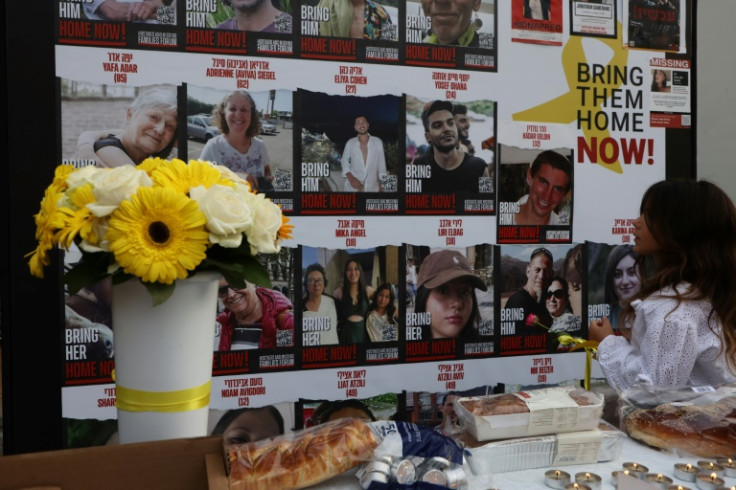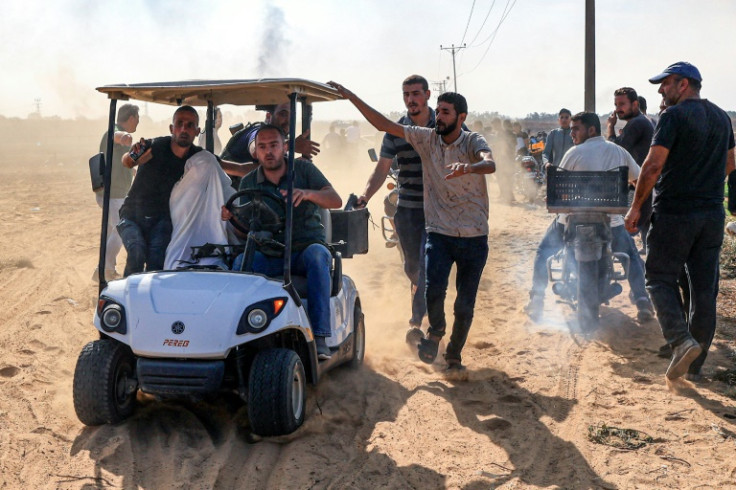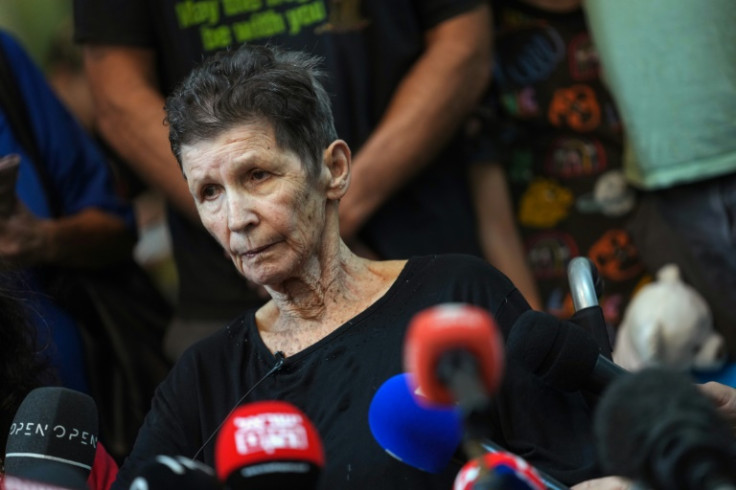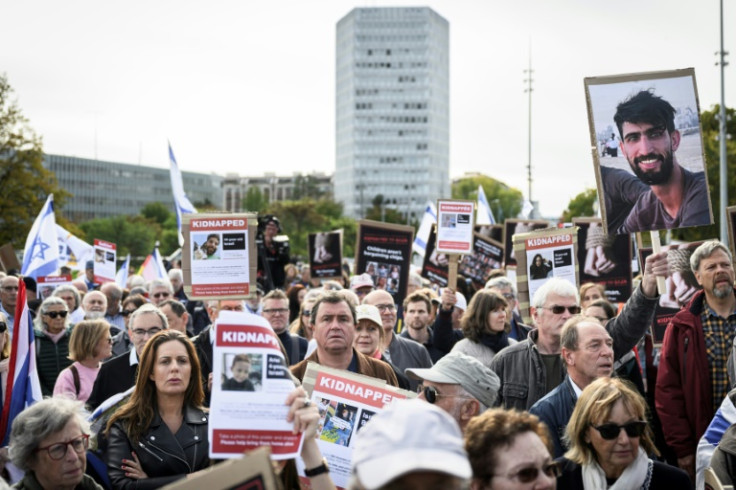Israelis Are Fighting To Free Their Captured Families From Hamas
The IDF estimates that around 240 people are still being held hostage by Hamas in Gaza, including a nine-month-old baby. I spoke to Gil Dickmann about how he is leading the efforts to bring the hostages back home.

When Hamas launched an unprecedented attack on Israeli civilians on 7 October, the proscribed terrorist organisation crossed into the nation on land and by sea and air.
According to Israeli officials who were quoted by the United Nations Office for the Coordination of Humanitarian Affairs (OCHA), the on-the-ground massacre resulted in at least 1,400 civilians and soldiers being killed.
Harrowing footage from the weekend not only exposed the militants for slaughtering innocent children and families, but the footage also showed Israeli civilians being kidnapped by Hamas.
Since the conflict between Hamas and the Israeli Defence Forces (IDF) escalated, the IDF has been bombarding Gaza with retaliatory rockets that set out to strike Hamas targets.
So far, the IDF has reported that the military has successfully destroyed more than 750 Hamas targets, noting that they will continue to fire missiles into Gaza while working to free the hundreds of captured civilians at the same time.
While Hamas continue to bombard Israel with around 100 missiles each day, most have been intercepted by the Iron Dome.
The Hamas-run Gaza Health Ministry reported that the IDF's assault on Gaza has resulted in more than 8,500 civilians, aid workers and journalists being killed.
Human Rights Watch also confirmed that the death toll in Gaza has exceeded 8,500.
In recent weeks, the IDF reported that an estimated 240 hostages are still being held captive in Gaza. The number of hostages includes children, the IDF said.
Nine-month-old baby Kfir has been named as one of the youngest unaccounted-for children who was seized by Hamas and taken into Gaza.
According to family members, the young child was taken alongside his four-year-old brother Ariel.
Images of the infants have been shown at pro-Israel protests across Europe that call for the return of civilians to Israel.
In a conversation with Gil Dickmann, an Israeli national leading the efforts to bring the hostages back home, told me: "My aunt was murdered."
"My cousin and her sister-in-law are kidnapped," he added.
When I asked Gil about how he learned of his aunt's disappearance, he informed me: "I scrolled through horrible videos posted by Hamas when I stumbled upon a video of her, barefoot and handcuffed, taken by terrorist(s) around the Kibbutz."
Just days before Hamas' assault on Israel, the scenic Kibbutz Be'eri, located near the eastern border with the Gaza Strip, was home to a large farming community of more than 1,000 people. Many of its residents were families with young children.
After the attack, babies' cribs were left crushed, homes were burned, hundreds of people were killed, civilians were taken and blood was seen all over.

Israel has since evacuated civilians from towns and villages close to the Strip, and the tragic events that took place in Kibbutz Be'eri continue to be referred to as the "Be'eri massacre".
After finding that his aunt had been kidnapped, Gil said: "A few hours later I saw another video. She was lying down, still, her face to the ground. It was obvious she has been shot dead."
Gil told me that at the time of her capture, "my cousin, his wife and their 3-year-old girl were in the house too", noting that they were "kidnapped from the safe room and put in a car that drove to Gaza".
"Safe rooms", widely known as a "Mamad" in Hebrew, are dedicated protection rooms that have been built in family homes in Israel.
In 1992, after the Gulf War, the Israeli Home Front Command employed new civil defence guidelines that made the rooms compulsory. These rooms act as a bomb shelter for Israeli civilians and are impermeable to chemical substances.
Thankfully, Gil added that shortly after the young family were taken, "right near the border [of Gaza] they managed to escape".
Gil continued to explain: "My cousin and his daughter hid for 20 hours. We found out what happened to them when he came back the morning after."
Gil's cousin "called his father and said, 'I'm alive. Geffen is with me. I don't know where Yarden is'", he said, explaining that it was clear that "his wife was kidnapped back to Gaza".
Yarden Roman Gat is a 35-year-old German-Israeli mother who has been described by her family as a "woman full of empathy and constantly spreads love to those around her".
Yarden's relatives have created the webpage 'Bring Yarden Home' to call for her, and the other 229 victims, to safely return to Israel.
Gil told me that he is also spreading awareness of the captured victims by "appearing in mainstream and social media with her picture and other details to spread awareness of the abductees' situation and call for their immediate release".
Gil is helping his cousin by meeting "with officials in the US" or "with officials like the Director-General of WHO (World Health Organisation) to promote action".
"In my appearances, I speak about the horrors, but also focus about the government's obligation to bring everyone back home. I try to seek they way to say that we don't want more violence and don't seek revenge," he explained.
Gil was adamant that Israelis "just want women, children, babies, elderly people and all the abductees to come back home safe".

This week, Yocheved Lifshitz, an 85-year-old Israeli woman who was taken by Hamas, was released on humanitarian grounds after Qatar facilitated a successful negotiation with Hamas.
Nurit Cooper, another elderly Israeli national, was returned to Israel alongside Yocheved.
Yocheved was the first released hostage to speak publicly about her ordeal and told reporters: "I went through a hell we never thought we could reach."
"I went through a nightmare we couldn't have imagined," she added.
Speaking to the press, the 85-year-old said that she and the hundreds of other hostages were held captive in Hamas' notorious "web of tunnels" under the Gaza Strip.
Discussing why Hamas has released a handful of hostages, Gil told me that he believes it is an attempt "to look humane and [to] mess with our brain".
Looking at Hamas' past actions, "raping, murdering, humiliating" civilians, Gil said that the proscribed terrorist organisation are using the kidnappings to achieve "psychological and strategic advantage on Israel to create more hatred, violence and fear".
Hamas is attempting "to satisfy their deepest needs and prevent any chance for future peace between the two nations", Gil added.
While Gil does not have a military officer status, he expects "all governments of the world to stop funding terror and spreading violence and start saving the lives of human beings who could still be saved".
Gil recognised that to save both Israeli and Palestinian lives, world leaders must "pressure Qatar, Hamas, and the Israeli government to get a deal done".
On Friday, 27 October, an overwhelming majority of nations, 120 countries, voted for a United Nations (UN) resolution that called for an "immediate, durable and sustainable humanitarian truce" in Gaza.
Gilad Erdan, the Ambassador of Israel to the UN, responded to the vote, saying that once Hamas lay down their arms, turn themselves in and return all Israeli civilians, "the war would end immediately".
"Israel will defend itself and will do what must be done to eradicate Hamas' capabilities and bring the hostages home," Erdan concluded.

Hamas is considered one of the richest terror groups in the world, generating an average income of approximately $350 million dollars each year in support from Iran alone – according to the House Financial Services Subcommittee on Oversight and Investigations.
Reports also show that Hamas has been receiving around $500 million in investments from a long line of secret networks around the world, including Turkey and Saudi Arabia. It has also been documented that the transactions are often disguised under false names and through real estate companies.
Although the Qatari government have played key roles in facilitating negotiations and mediation during conflicts, the authorities have been financing Hamas since it started to govern the Gaza Strip in 2007.
Governments need to "stop funding terror and Qatar specifically as long as there are abductees," says Gil.
Gil also expressed that he has an issue with the word "hostages" being used to describe the Hamas victims who were kidnapped and taken to the Strip.
The media should "stop using the word "hostages", that's supposed to be used specifically for soldiers," he said.
While civilians in the West continue to protest the IDF striking of Gaza and call for a ceasefire, Gil warned that if Hamas continue to operate, everyone needs to "understand that if my cousin is not safe in her home, and could be taken, murdered or worse - then no person on earth is safe".
Israel has shut off electricity in the enclave, which was once home to more than two million Palestinians.
Almost half (47%) of the population in Gaza, are children.
The civilians stuck in the Strip, have been left to function on a diesel-fuelled power station, which normally provides another 25 per cent of Gaza's electricity supply, and solar panels and private generators.
On Friday, it was announced that internet and mobile communication services have collapsed in the Palestinian territory. The telecommunication has since been restored in Gaza, but it is unclear how long the signal will last.
Before Israel formally declared war on Gaza, around 150 to 200 humanitarian aid trucks were arriving in the Strip each day. But since the Rafah crossing was opened by Egypt on 21 October, just 10 to 20 aid trucks have been entering.
Without a ceasefire, Israelis have been left fighting to free their loved ones from Hamas' imprisonment and Palestinians have been left living in the dark, fighting for survival.
© Copyright IBTimes 2025. All rights reserved.





















